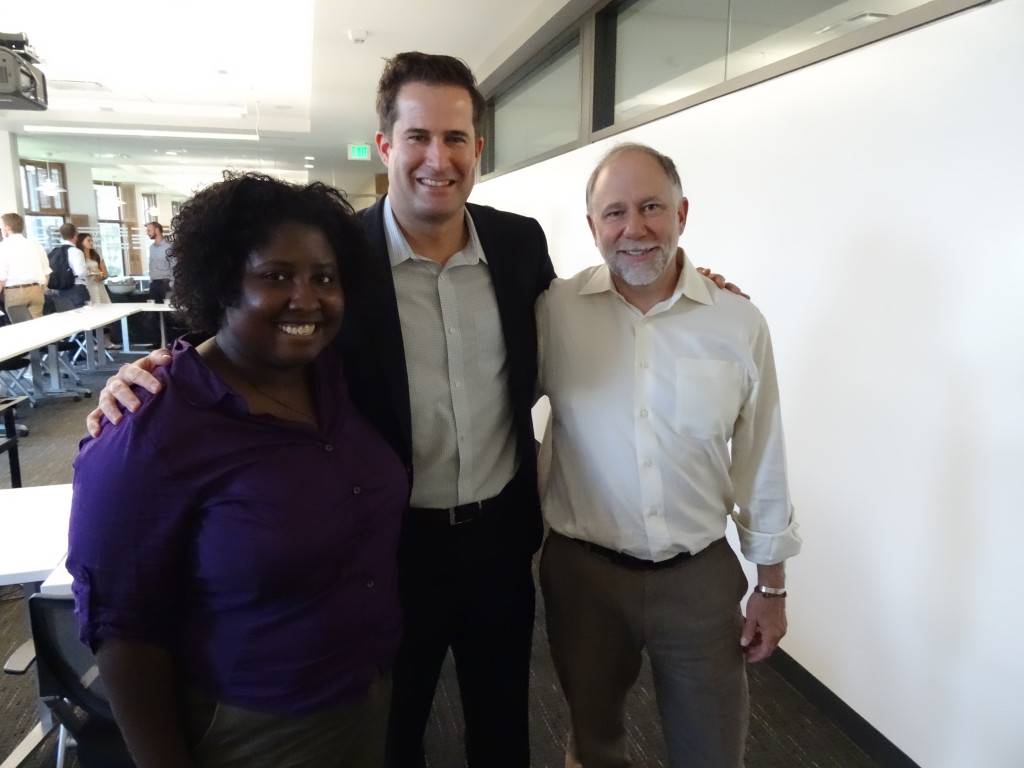
Do Veterans Treatment Courts Make a Difference?

A conversation with Rep. Seth Moulton (Massachusetts, District 6) and the Stanford Veterans Law Organization
Four years ago in 2010, the White House issued a call to action to counties and cities to improve judicial treatment for veterans.[1] The Justice Department found that that about 60% of the 140,000 veterans in Federal and State prisons suffer substance use, with one in four inmates who are veterans reporting being under the influence of drugs at the time of their offense.[2] Substance abuse among veterans sometimes connects to PTSD and other combat stress factors and can lead to homelessness and domestic violence. Recognizing that specialty courts may help to connect these veterans to mental health services that standard courts may overlook, the Administration financed the Veterans Treatment Court Planning Initiative as a pillar in supporting veterans access to services.
Yet, in a lunchtime conversation with the Stanford Veterans Policy Lab Practicum and the Stanford Veterans Law Organization, Congressman Seth Moulton took issue with the limits of veterans treatment courts. Although there are now over 250 courts nationwide, jurisdictions have different practices in allowing veterans access, with some jurisdictions disallowing veterans who were not honorably discharged. Unfortunately, as Rep. Moulton pointed out, these may be the veterans who especially need access to the very services that they are denied. After four tours of duty in Iraq, and deep study of veterans issues both at Harvard and on the Hill, Rep. Moulton sees veterans treatment courts as a vital tool in addressing veterans mental health issues, but he noted that there is no scholarly policy research that analyzes the value of their practices, processes, and outcomes.[3] He called on the Stanford Policy Lab Practicum to undertake a study of veterans treatment courts across jurisdictions.

Veterans treatment courts or veterans justice courts are specialty courts instituted to incorporate the training and flexibility to better address veterans issues and guide veterans to services targeted to their needs. Sometimes these are also drug offense courts with a veterans’ wing. First instituted in 2008 in Buffalo, NY, these courts have grown exponentially over the past seven years. Depending on the jurisdiction, these courts address a range of civil, and sometimes criminal, issues involving veterans with the goal of better serving the needs of a population afflicted by issues related to military combat.
In the conversation with Rep. Moulton, Practicum participants and the Stanford Law Veterans Organization discussed the lack of reliable research on the effectiveness and outcomes of VTC’s. In a discussion comprised by veterans now pursuing law degrees, these experts speculated that jurisdictions considering instituting VTC’s must operate on intuition and ad hoc information in rationalizing the value of such courts. Participants noted that jurisdictions also do not have data that can help guide them in best practices. Moreover, no data exists on whether the outcomes from VTC’s differ from one jurisdiction to another – each with its own rules and standards — or from other regular courts. Assuming that there are differences in outcomes across jurisdictions and between VTC’s and standard courts, counties considering instituting a VTC must ask whether these courts are worth the investment in resources of time, training, and cost. The gap in knowledge impacts public policy as well as the lives of individual veterans and their families and communities.
Mental health courts offer a starting place for how to conduct a rigorous inquiry into assessing these types of specialty courts. Research on mental health specialty courts offers evaluative strategies that may guide research on veterans courts. To help remedy the lack of evidence for a model for these types of specialty courts, the Stanford Veterans Policy Lab Practicum is now considering bringing together legal scholars, judges, and public leaders for a conference to discuss the effectiveness of veterans treatment courts nationwide. The conference would help prompt scholarly attention to the practices that can guide jurisdictions in establishing effective justice and services for veterans.
[1] See Office of National Drug Control Policy, Fact Sheet, https://www.whitehouse.gov/sites/default/files/ondcp/Fact_Sheets/veterans_treatment_courts_fact_sheet_12-13-10.pdf. In an effort to replicate the success of the first Veterans Courts, the White House launched an initiative in 2010 to help more communities establish VTC’s.[1] The Veterans Treatment Court Planning Initiative (VTCPI) is a collaborative effort of the Bureau of Justice Assistance (BJA), the Department of Veterans Affairs, the National Drug Court Institute (NDCI), and numerous Veterans Treatment Court professionals. The training program selects, funds, and trains jurisdictions across the country in establishing VTC’s.
[2] Office of Justice Programs/Bureau of Justice Statistics, Veterans in State and Federal Prison, 2004, U.S. Department of Justice [May 2007], http://bjs.ojp.usdoj.gov/content/pub/pdf/vsfp04.pdf
[3] One notable study, focusing on the Travis County Jail in Texas (where Austin is the county seat), documented the number of veterans arrested each month, the rate of recidivism, the charges filed, and whether the veterans had received VA services. Although the study does not address VTCs, it does offer a deep analysis of the need for targeted treatment plans for veterans. See Report of Veterans Arrested and Booked into the Travis County Jail, July 2009, http://justiceforvets.org/sites/default/files/files/Texas%20Veterans%20Justice%20Research.pdf.
Leave a Comment